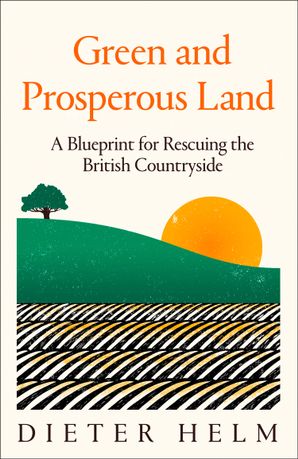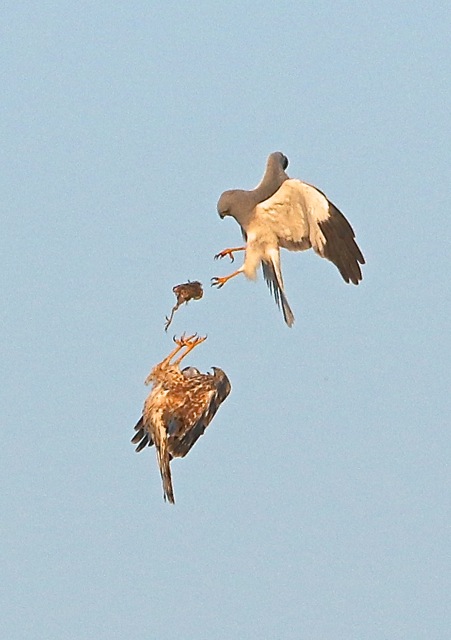
This is an important book It is written by a leading Oxford University economist who is also a wildlife enthusiast but, probably more importantly, the chair of the Natural Capital Committee. Helm is an outsider inside the system. Although I’d describe his views as right of centre (it probably depends where you are looking from) they are not lazy right-wing views and I think we can expect his views to be listened to by the likes of Michael Gove.
So when Helm says in this book the following things about grouse shooting we can imagine that these views might permeate the corridors of Defra’s Nobel House more effectively than if the likes of George Monbiot or I said them (even though we probably would, if we could):
Many of our uplands are a shadow of what they once were. … Our uplands are overgrazed by sheep and manicured for the shooting fraternity. Imagine if the heather moors were managed not just for grouse and deer, but also for the wider public benefit. Imagine if the hen harriers were not persecuted, so people could watch the male bird pass its prey in mid-air to the female, and watch as the birds hunt low over the land.

Hen Harrier food pass. Photo: Gordon Yates
The combination of sheep, deer and grouse has not been as beneficial to the uplands biodiversity (sic) as it might have been, and given the poor economic returns of sheep, the scope for improvement without significant economic cost is considerable. The uplands contribute very little to food security, and little to economic food production. They overwhelmingly depend on subsidies.
To the estates and their gamekeepers, anything that gets in the way of the game birds is vermin and should be killed. Gamekeepers are masters at this and over the last couple of centuries have got rid of lots of golden eagles, hen harriers and buzzards, as well as stoats, weasels and foxes. In the Cairngorms the estates even shoot the realtively rare mountain hares for sport and because they might spread diseases from ticks, which might then infect the grouse.
The case of the hen harriers is perhaps the best known. Hen harriers are well adapted to Britain’s uplands and were once common. The gamekeepers have put paid to this abundance, through poisoned bait and traps and by shooting them. There are only a few pairs left, and still the gamekeepers try to kill them.
The obvious incentive on the estates is to kill them [hen harriers]. Indeed to eradicate them. That is what they have done. At one level this is just criminal, and we are more prosperous if the criminals are deterred.
Responsibility for the consequences of grouse moor management lies with the owners. They are the ‘polluters’ imposing costs on the rest of us, and they should pay. A more prosperous uplands would start with the licensing of game shoots and then a levy to put right the damage.
There is an awful lot more in this vein, but of course this is not a book about grouse shooting, but grouse shooting provides a devastating critique of the unsustainable and uneconomic current land use in the uplands. Similar analyses abound for other industries – although grouse shooting, uncriticised and uncensured by Gove and Coffey to date, is a very clear example of how we need to change.
The book is clearly and didactively written. There is little doubt in Helm’s writing about what is and isn’t the case. If you know a bit more than Helm does about wildlife, as I think I do, then he trips now and again (but never falls flat on his face) whereas if you know less about economics than Helm does (as I certainly do) it is difficult to detect whether he gallops sure-footedly across the terrain or not. This book, though, is a good read and an important one too. I loved it, as I agreed with much of it and was interested by all of it.
If you worry about putting a value on nature then you really should read this book – it will make you both more and less worried in turn, but more informed all the same.
It’s quite a high-level view of the subject, and very valuable for that, but there is quite a lot of ‘somebody else will have to do the hard work of filling in the details to make this work’ in the book which made this reader wonder who on earth those people were. Where are they located today? In Defra or NE? You must be joking – most of the good people left or were sacked! In the NGOs? Maybe – but, if so, they are quite well hidden right now?
From my perspective I cannot help but enjoy the swipes at the chair of the Efra Committee for not really knowing what are public goods, and at the NFU for being consistently stupid and self-serving. Any farmer who voted for Brexit (and so many did) should read this book to see the consequences on their actions on their industry.
But this is a book for many to read. It’s high-level, it’s wide-ranging but it’s probably also largely right. And where it isn’t right then we need to understand the ideas explained here well enough to combat unwanted consequences.
Quite honestly, if Michael Gove, Philip Hammond and Theresa May read this book, and think about it, then even with a ghastly Conservative government in place the natural world could have a better future.
Green and Prosperous Land: a blueprint for rescuing the British countryside by Dieter Helm is published by Harper Collins.
Remarkable Birds by Mark Avery is published by Thames and Hudson – for reviews see here.
Inglorious: conflict in the uplands by Mark Avery is published by Bloomsbury – for reviews see here.
[registration_form]
Oh golly! Tragic to read about the hen harriers. Would be great to have the land return to its former glory and become The Land Of Hope & Glory. I am sure Farage would love this!
What a breath of fresh air you have illustrated here Mark. Helm is certainly pretty high up in the Defra advisory circles and is listen to. So it is very gratifying that he is saying and reinforcing more or less all of what you have been saying for so long ,Mark.
Whether this book will have much influence on the likes of Coffey, I doubt as I have been becoming more and more convinced that her antediluvian views are being backed by May, otherwise I think we would have seen some concessions from Coffey by now. (Remember May promised before the last election to repeal the ban on the hunting with dogs Act). So she too clearly supports all the nastiness of hunting. Fortunatatly she didn’t achieve a sufficient majority to be able to bring this promise into effect.
Let’s hope this book of Helm’s does push things in the right direction but until the likes of May and Coffey are swept away I think it will continue to be a very up hill battle. However where hopefully the book could have some good benefit is in Scotland and I think those with influence there need to make sure it is read by the decision makers there.
What a fantastic post to wake up to on a Sunday morning! Rank and file conservative members should in several ways be the LEAST likely of all the political party supporters to fly the flag for grouse moors. Yes if they believe the anti GM movement is driven by the ‘politics of envy’ and ‘class war’ they’ll stand shoulder to shoulder with the Nick Soames, Simon Hart, Richard Benyon bunch. But when it’s apparent that political and financial support is being given on the basis of the old boy network and that’s killing off opportunities for public, private and third sector enterprise then they’ll be seriously pissed off. Who in their right mind would want a depressed rural economy that’s dependent on welfare when the few seasonal jobs have come and gone, on top of being a dreary, wildlife poor dump? The inner clique might be happy with that, the vast majority of Tory voters who don’t shoot at all never mind participate in driven grouse shooting won’t be pleased with them once the message broadens into economic as well as environmental and conservation issues. Bad for wildlife AND jobs, even the wealthy and well connected wouldn’t be able to save DGS from that message if it’s taken up by the public.
I’m tempted to put this alongside Isabella Tree’s Wilding as potentially one of the most positively influential books on UK conservation around today.
I don’t agree with all Dieter Helm writes, and am very queasy about how the natural capital approach might be misused in the real world. But, if applied well, to bolster non-economic imperatives to conserve nature, the prize set out by Helm might just be achievable. And it’s a huge prize, economically as well as morally compelling, as Helm sets out convincingly.
I’d urge everyone – not just May, Gove, Hammond et al – to read this book, with a critical but open mind. And apply some of its suggestions.
Incidentally, I very much doubt the situation for hen harriers would be on Dieter’s radar had Mark, Ruth etc not campaigned so hard over the last few years. It’s a testament to you that such words appear in a book like this. Momentum for change is getting hard to resist.
I rather like Dieter Helm, probably because he doesn’t suck up to politicians. Although I’m far from convinced that putting a value on esoteric things isn’t just a job-creation scheme for economists and opens the door for entry-fees to the countryside. There is a video about this book on his website.
Nevertheless it’s another Sunday and another book I can’t do without – I promised myself I wouldn’t buy any more on the strength of a review until I have read the ones I already bought on the strength of a review. The Carbon Crunch, Natural Capital, Doughnut Economics (too thick), Meat – A Benign Extravagance, Waste, Defending Beef – all on the shelf unopened with the strong possibility these eventually will be given away to friends whether they want them or not. I will have a crack at Green Capitalism – manufacturing scarcity in an age of abundance – because I like the title and it isn’t too thick.
This is not to say I don’t read though but – I read Norwegian Wood by Lars Mytting in one session pausing only for some mince pies and a large Ballantine’s. And I stuck with Extraordinary Popular Delusions and the Madness of Crowds to the end, the same with Dirt, An Inconvenient Death, two biographies of Dylan Thomas, and best of all – Futurebabble, which dissects and disposes of babble about the future that was uttered in the past.
A blue plarstic envelope lurks on my desk – I suppose I’d better look inside since Postman Ken has schlepped all the way up here in the mud to deliver it. Aha! Green Hell by Steve Milloy.
A thought – if the Sage of Ottle wants a collection of Harry Crews he can have them for the price of the postage – I can’t in all conscience dump them in the bookshop at Mottisfont in case people read them.